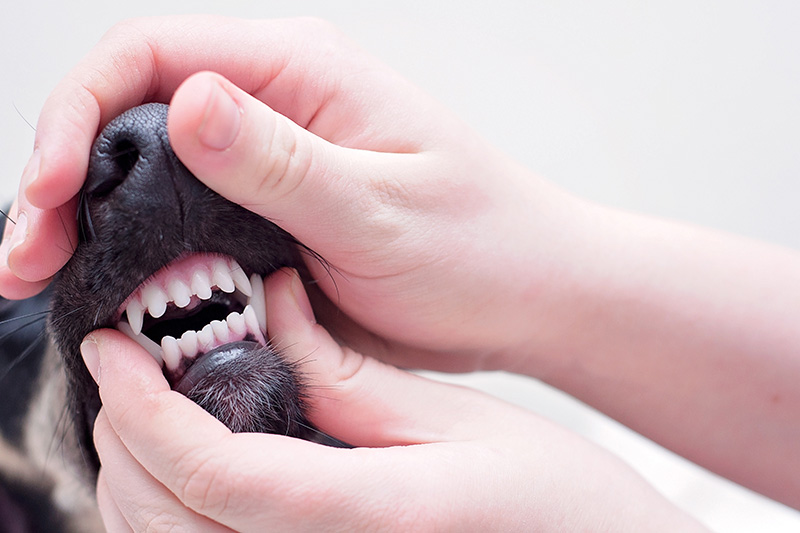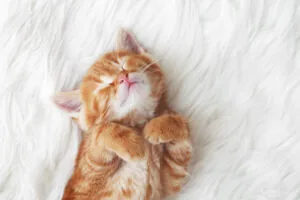February is National Dental Health Month

Your pet’s oral health plays a significant part in ensuring a long and healthy life. Periodontal disease can not only damage your pet’s teeth and gums but their internal organs as well. Most periodontal disease occurs below the gum line where you can’t see it. Bacteria that you can’t see can damage the tissues connecting the teeth and jaw.
Periodontal Disease
Periodontal disease is the most common problem affecting pets in all age groups. Diseases that affect the oral tissues can cause the teeth to fall out. There are primary organ diseases that can cause oral lesions. Finally, periodontal disease can have a secondary effect on major organs, causing or exacerbating organ system diseases. The very best way to prevent periodontal disease is daily dental home care, but it is useful to add effective, evidence-based dental food to provide daily plaque control. The specific risk factors that can contribute to periodontal disease in dogs include:
Breed and Age
Purebreds, small dogs, and pets with short muzzles are prone to overcrowding and rotation of teeth, as well as misalignment. The older the pet, the longer dental disease has to accumulate.
Immune System Health and Nutrition
A healthy immune system contributes to a healthy mouth. Nutrition can contribute to preventing periodontal disease and gingivitis. The food’s texture and make-up can affect the environment of the mouth. It can help maintain tissue integrity, stimulate saliva production, alter plaque bacteria metabolism, and provide mechanical cleansing of tooth surfaces. It was commonly recommended to feed dry food to prevent periodontal disease in pets. However, in clinical studies, dry food alone did not contribute to improved oral health.
Brushing your pet’s teeth is the single most important thing you can do between professional dental prophylaxis.
What Is a Dental Prophylaxis?
A dental prophylaxis (sometimes called a prophy or a dental cleaning), is a dental procedure that removes plaque and tartar from a pet’s teeth, and the health of the entire mouth (tongue, gums, lips, and teeth) is assessed.
What Procedures or Tests Are Needed Before?
A proper dental procedure for your pet requires him to be placed under general anesthesia. Prior to such a procedure, your veterinarian should perform a complete physical examination. Some basic blood tests, including evaluation of liver and kidney function and red and white blood cell counts, may also be done before an anesthetic procedure. If there is any concern of kidney disease, a urinalysis should also be part of the work-up. Concerns about heart function, such as the presence of a heart murmur, may need to be addressed.
How Is the Canine’s Dental Procedure Operation Done?
Your pet needs to be under general anesthesia for a dental procedure for several reasons. A complete examination and cleaning of all teeth cannot be performed efficiently and safely (for both your pet and the veterinarian) if your dog is awake. After your dog has been placed under general anesthesia, your veterinarian will examine all of the teeth and gums. If any periodontal pockets (loss of bone around the tooth, below the gum line) are found, dental radiographs may be done to assess the extent of the damage. Appropriate treatment of diseased teeth is done. Using an ultrasonic instrument, your veterinarian will remove the tartar on the teeth by scraping the tartar with a vibrating probe. This allows minimal damage to the tooth enamel. After all the tartar and plaque have been removed, the teeth are polished with a special tooth polish.
The length of a dental procedure can vary greatly. A straightforward cleaning may take 20-40 minutes. Any dental disease that requires more treatment than just a cleaning or any necessary tooth extractions will, of course, require more time. Most dental procedures are complete within one hour and your dog may only spend one day in the hospital. Any concern of recovery from the anesthesia may warrant an overnight stay in the hospital for observation.
What Is the Typical Care After Dental Cleaning?
Care for your pet after a dental procedure depends on the extensiveness of the procedure. Special care is usually not required after a simple cleaning. If tooth extractions or advanced periodontal treatment were performed, feeding softer food, administering antibiotics, and using an oral rinse may be recommended while healing occurs.
What Can I Do at Home for My Pet’s Oral Health?
Prevention of the most common oral disease in pets consists of frequent removal of the dental plaque and tartar that forms on teeth that are not kept clean.
Brush Your Pet’s Teeth
Most of us start and end each day with brushing, so why should your pet be any different? Brushing your pet’s teeth daily can significantly decrease the likelihood of periodontal disease. Brushing helps remove plaque and tartar that can build up due to forms of bacteria, food particles, and saliva accumulating in your pet’s mouth. Without brushing, tartar buildup can lead to periodontal disease which erodes at the gums and can result in bad breath, bleeding gums, pain, and significant health complications.
Watch What Your Pets Eat
Many dental problems can actually be caused by malnutrition, so it’s important to feed your pet a nutritious, species-appropriate diet. Fortunately, there are also many products created especially to help improve your pet’s dental health.
- Look for foods with the Veterinary Oral Health Council seal of approval, which recognizes products for helping to prevent both tartar and plaque
- Give your pet non-edible bones to help grind away tartar through repetitive chewing
- Offer raw bones about the size of your pet’s head in order to prevent tooth fractures
- Add solution to your pet’s drinking water to help fight bacteria
See Your Vet
Your pet’s semi-annual wellness appointments are the best time to discuss your pet’s dental health and what further steps should be taken.
Share This Post
Recent Posts
About Shallowford Animal Hospital
Shallowford Animal Hospital and The Pet Spa at Shallowford are dedicated to the exceptional, compassionate care your pet deserves. Pets hold a very special place in our families, and we treat yours like our own.



